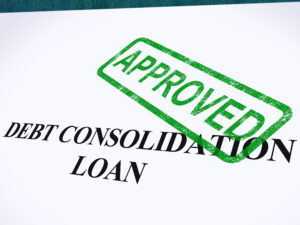When you’re neck-deep in debt, choosing to start a debt consolidation plan can get you out of hot water. It combines all your existing debt into a single payment—typically with a lower interest rate. This process will help you tackle one big hurdle at a lower cost instead of allowing many of your loans to accumulate over time.
We’ll show you how to consolidate credit card debt without hurting your credit and help you decide if it’s the right debt management plan for you.

How Does Debt Consolidation Work?
Debt consolidation is a common way individuals can manage their repayment plan. It puts together all their existing debt into one larger loan at a smaller interest rate. The average credit card interest is 16%, but consolidating can bring that value as low as 6% per year . The most basic way to consolidate is by taking a low-interest personal loan to pay off other existing loans. You’ll then focus on repaying that one loan until the balance is fully paid off.
Even if your credit score isn’t at an ideal range, there’s a big chance that you can score a much lower rate with a dedicated debt management program. You can use a debt pay-off calculator to help you compare total repayments by inputting interest rates, balances, and minimum payments for each of your cards.
But consolidating your debt isn’t as simple as it sounds. For one, if your credit score isn’t good, it’s going to be tough getting approved for a new loan. Taking extra loans on your own may also impact your credit score. But don’t worry; there are alternative ways to consolidate your debt without further reducing your credit score—even if it’s floating at a low 300-580.

Should You Consolidate Debt?
Debt consolidation isn’t for everyone. If you’re on the fence about whether it can benefit you, here are a few things you should consider.
Debt consolidation is a good idea if:
- You need an organized debt management plan to drop your high-interest credit cards. In exchange, you only have to repay one loan with less interest. It’s especially useful if you have multiple debts and have trouble reminding yourself to make the repayments on time!
- You can afford to make regular repayments. Remember that debt consolidation puts all your debts into one basket—but doesn’t completely relieve you from them. Having a stable income with enough extra to afford repayments is highly recommended before considering this journey.
- You’re serious about getting out of debt. If you qualify for any debt management or relief program, the chances are that they’ll come with a series of requirements, such as not allowing you to take on more debt. Moreover, not making your repayments can force your credit score to plummet. It can then put you in deeper trouble in the off chance that you become a delinquent client.
Getting debt consolidation loans isn’t a good idea if:
- You can’t commit to the repayments. It could be for various reasons, such as not having a stable job or not adjusting your spending habits to accommodate a strict debt repayment program.
- The credit union, credit counselor, bank, or similar institution you approach only offers high interest rates. In this case, it might not be worth going through the trouble.
- You aren’t confident that debt consolidation can help your situation. It’s highly recommended that you first consult a financial institution to understand what their debt management program entails so you know if it’s something that could work for you.

Best Way to Consolidate Debt Without Hurting Credit
It’s important to know that opting to consolidate debt won’t affect your credit score. But joining a debt management program will reflect on your credit report. This may keep you from opening new credit accounts, and you’ll have to comply with strict rules within the program—especially with regard to making the minimum payments on time. Moreover, if you can’t make your payments, the financial institution may remove you from the program—possibly with a lower credit score.
On that note, most debt consolidation loans and programs don’t impose many qualifications, so you can safely join one despite having bad credit. Being able to prove your source of income and ability to pay off your debt is often enough to justify your intent.
Get Help From Prudent Financial Solutions
Credit unions, banks, and counselors are financial institutions that tend to be more open to helping people with poor credit get a debt consolidation plan. It’s a good idea to approach a debt solutions company that offers consultative and tailored financial solutions.
Prudent Financial Solutions can help you get a better grasp of your situation. We will evaluate your qualifications based on your credit history and ability to repay the minimum monthly payments. You would want to go for interest rates between 5-10% for a smooth debt repayment journey.
Opt For a Secured Loan
There are times when premade debt consolidation programs can’t accommodate your preferred repayment plan or cover vehicle and home equity loans. In turn, you may want to take things into your own hands by creating a program for yourself.
One way you can do so is by taking a secured loan, which requires you to provide collateral equal to the amount you’re borrowing. It’s much easier to get approved for a secured loan, even with bad credit, as the lender gets financial protection from your collateral. Likewise, you’ll lose the collateral if you can’t make the repayments on time.
Get a Credit Card Balance Transfer
In the elusive world of debt consolidation, a balance transfer credit card is the best way to dodge paying any interest. It allows you to transfer the balance from as many credit cards as possible into one new card with a 0% APY. This perk isn’t permanent—you’ll have approximately 18 months or so to make on-time payments for free. After that period ends, you’ll be back to paying the minimum monthly balance with interest.
Depending on your situation, this route can be the cheapest way to consolidate credit—especially if you can pay everything off within the 0% interest period. While chances of getting approved are slim if your credit score is under 670, it’s worth a try.

Need help with debt consolidation?
Ultimately, debt consolidation can be a big relief to your financial situation, especially if you’ve been struggling with managing your debts. There are various programs, plans, and even debt settlement options. If you want to know the best option for your situation, don’t hesitate to call us at 1 877-612-3249.